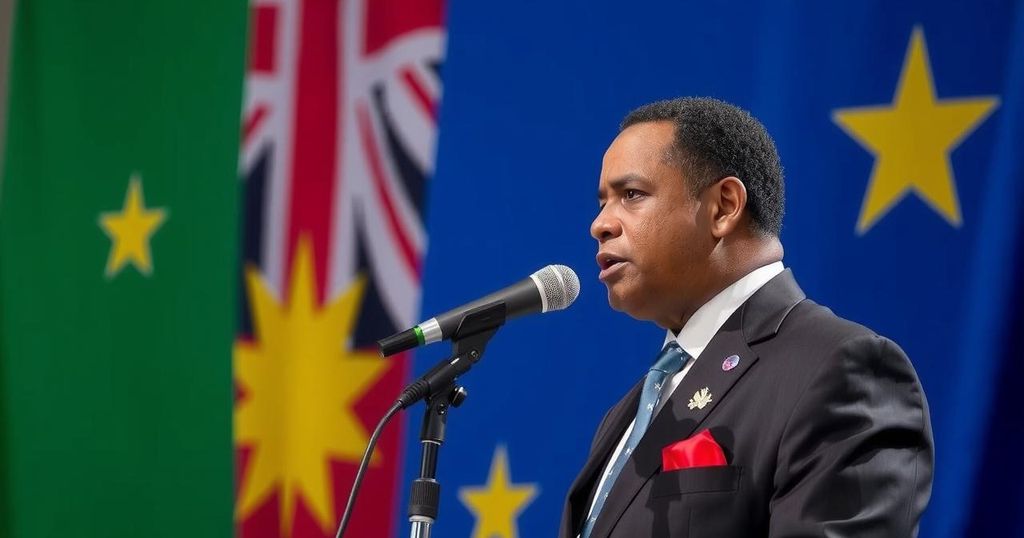Mauritius Prime Minister Acknowledges Election Defeat, Opposition Set to Lead

Mauritius Prime Minister Pravind Jugnauth conceded defeat in the recent legislative elections, projecting that the opposition, led by Navin Ramgoolam, is likely to take power. The elections were overshadowed by a wiretapping scandal, contributing to growing concerns over governance. Both sides had focused their campaigns on improving living conditions for citizens amidst economic challenges. Ramgoolam expressed confidence in his coalition’s success as the nation prepares for potential leadership changes.
On Monday, Mauritius Prime Minister Pravind Jugnauth acknowledged that his coalition was poised for a significant defeat in the contentious legislative elections. Although the final results from the elections held on Sunday are yet to be confirmed, opposition leader Navin Ramgoolam appears set to assume office once again, heading the Alliance of Change coalition. Mr. Jugnauth, leader of the Lepep alliance, indicated that voters had opted for a different leadership, stating, “The people have chosen another team to lead the country.”
Commenting on the electoral process, Jugnauth called for respect towards the electoral outcome, extending his best wishes to the nation and its people. Delays in announcing results are attributed to incidents on election day that impacted the counting of votes. The elections were for 62 of the 70 parliamentary seats, under a system where single coalitions traditionally dominate the National Assembly due to the winner-takes-all format.
Last month, Prime Minister Jugnauth celebrated a historic agreement with Britain concerning the sovereignty of the Chagos Islands, a long-standing source of contention. Despite his previous successes, the recent elections were marred by a wiretapping scandal involving leaked recordings of various influential figures. The scandal prompted a temporary social media ban intended to curb the dissemination of information, a move that heightened concerns regarding the erosion of democracy and civil liberties in Mauritius.
The electoral campaigns from both sides pledged improvements for citizens facing rising living costs, despite prevailing economic growth. The Alliance of Change’s manifesto proposed a family welfare fund, pension increases, fuel price reductions, and measures to combat corruption. Moreover, it advocates for electoral reform, including alterations to the selection of the president and parliament speaker.
Both Jugnauth and Ramgoolam hail from prominent political families that have significantly influenced Mauritius since its independence in 1968. Ramgoolam, prominent in his own right, expressed confidence in the electoral outcome, stating, “We are heading towards a big victory tomorrow. The people are waiting for this liberation.” Despite warnings regarding potential election fraud, the voting day reportedly proceeded with minimal disturbances, albeit with some incidents reported after the polls closed.
Mauritius, recognized for its stability and economic growth, relies heavily on tourism and financial services, with a per capita GDP surpassing $10,000 in 2022. The Chagos Islands agreement symbolizes a step toward decolonization, although Britain maintains a strategic military presence on Diego Garcia.
In light of recent events, the electoral shift indicates a potential change in governance and a new opportunity for progress in addressing the concerns of Mauritian citizens. The implications of these elections will be crucial for the future direction of the nation as the new leadership prepares to take office.
Mauritius is renowned for its political stability and prosperity in the African region. The political landscape has been dominated by leading political families since its independence from Britain in 1968, causing a concentration of power under a few major parties. The current electoral scenario is influenced by significant events such as the wiretapping scandal that has raised concerns around governance and transparency. The socio-economic environment is characterized by a growing cost of living crisis, prompting promises from candidates to implement substantial reforms to support citizens. International relations, particularly regarding the Chagos Islands dispute, play an essential role in shaping national discourse and political strategy.
The recent acknowledgment of electoral defeat by Prime Minister Jugnauth signals a transformative moment in the political framework of Mauritius. With Navin Ramgoolam’s probable return to office, the anticipated reforms aimed at addressing socio-economic challenges highlight the electorate’s desire for change. This electoral cycle not only reflects the immediate political dynamics but also sets the stage for ongoing discussions regarding governance, civil liberties, and national identity in Mauritius. The move towards reforms proposed by the new coalition will be intricate yet vital in steering the nation towards sustainable development and greater accountability.
Original Source: www.bellevueheraldleader.com








